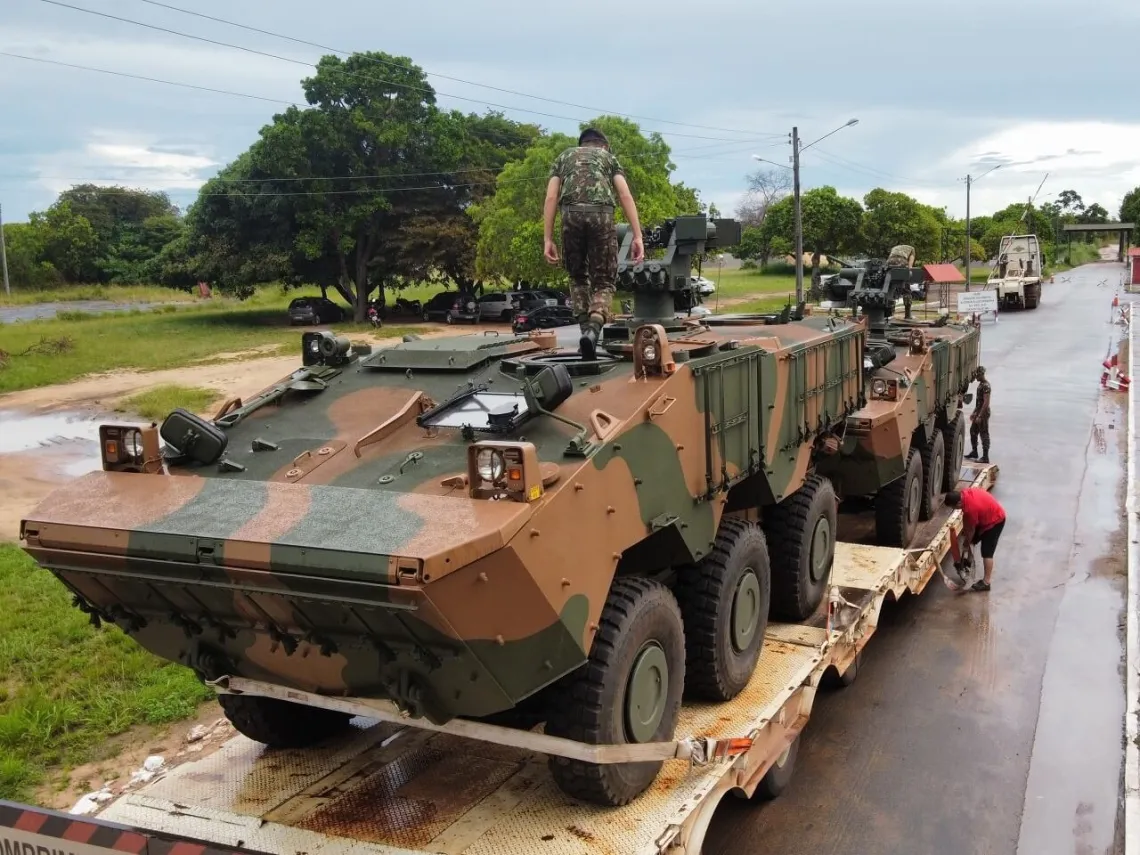(Reuters) – The Ministry of Defense has decided to reinforce the Brazilian military presence in the border region with Venezuela and Guyana and will send armored vehicles to a military grouping located in Boa Vista, capital of Roraima, amid increased tension between the two neighbors after the plebiscite in which Venezuelans approved the annexation of the Guyanese region of Essequibo.
“The Ministry of Defense informs that there is a movement of Army armored vehicles to complete the material endowment of the 18th Mechanized Cavalry Regiment, located in Boa Vista (RR), and recently created to replace the 12th Mechanized Cavalry Fleet. This move had already been planned and is included in the Army’s Strategic Plan,” the ministry said in a statement on Tuesday.
The Army’s Social Communication Center confirmed the anticipation of the “reinforcement of troops and means of military employment in the cities of Pacaraima and Boa Vista”, although it stressed that, on the Brazilian side, movement on the border has been normal.
The communiqué pointed out that the 1st Jungle Infantry Brigade in Roraima, which has “almost 2,000 military personnel, has intensified its presence on that border strip in order to better fulfill its mission of surveillance and protection of the national territory”.
“It should be noted that the evolution of the current Mechanized Fleet, organic to that Brigade, into a Mechanized Cavalry Regiment, is a pre-planned strategic action that was already included in the Army’s Strategic Planning (PEEx),” he added.
According to the Army, the process will result in an increase in the number of military personnel in the area, as well as armored vehicles, which will be moved from the South and Midwest of the country to Roraima.
“These vehicles, such as the 16 4×4 Guaicurus Multitask Armored Vehicles, will be deployed to form part of the newly created Military Unit during the month of December, and are expected to arrive in Boa Vista in around 20 days,” he said.
Earlier, a source linked to the Army Command told Reuters that the Guaicuru armored vehicles and military personnel from the South and Midwest regions of the country were heading to Roraima to reinforce security in the region.
According to the source, the military group was also upgraded from a cavalry squadron to a cavalry regiment. Although there are still no official figures for the reinforcements, the source said that a regiment can have up to 600 soldiers.
Since last week, the Ministry of Defense has decided to intensify defense actions in the region.
The Army’s Social Communication Center had already confirmed an increase in the number of troops in the border platoon from 70 to 130. According to the agency, the troop movements are part of the advanced training of the 1st Jungle Infantry Brigade, aimed at maintaining the readiness and operational efficiency of the Ground Force.
The source linked to the Army Command said on Monday that, on the Brazilian side, movement on the border has been normal. The source stressed that permanent surveillance in the region has been stepped up to prevent Brazil from being surprised by any kind of military action attempting to use part of Brazilian territory.
“No action by either side can take advantage of our territory,” the source said.
DISINFLATE
In an interview with Reuters on Monday, Itamaraty’s secretary for Latin America and the Caribbean, Ambassador Gisela Padovan, said that South America is in a position to “deflate” tensions between Venezuela and Guyana in order to avoid a confrontation after the plebiscite at the weekend approved the annexation of a large part of neighboring Guyana’s territory.
According to her, the Brazilian government is following the situation between the two neighbors with concern, but does not believe that the situation will progress to an armed confrontation, since several negotiations are being held by leaders of the region — including President Luiz Inácio Lula da Silva — with the presidents of Venezuela and Guyana.
“We follow the situation with concern, but I don’t think we’re going to get to that (armed conflict). I think we have the capacity in the region to deflate this process,” the ambassador told Reuters when asked if the climate between the two countries could culminate in a military confrontation.
“We advocate a peaceful solution to this issue, and what we don’t want is what President Lula called confusion, and I call conflict. I think a conflict would be totally undesirable at a time when we are resuming the integration of South America, resuming meetings of the 12 countries on various issues, including defense,” he added.
*** Translated by DEFCONPress FYI Team ***
